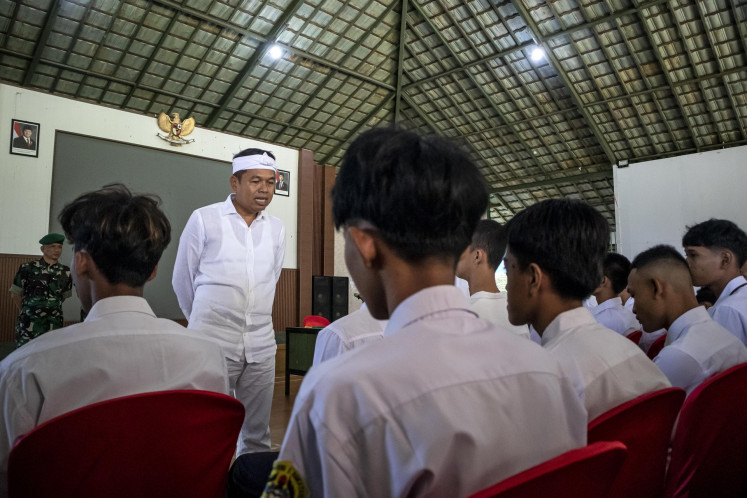Under the shadow: a horror movie discussing sharia law
Fear: Shideh (Narges Rashidi) hugs her daughter Dorsa (Avin Manshadi) in a promotional poster for Under the Shadow, the debut feature film from Babak Anvari
Change text size
Gift Premium Articles
to Anyone

F
span class="caption">Fear: Shideh (Narges Rashidi) hugs her daughter Dorsa (Avin Manshadi) in a promotional poster for Under the Shadow, the debut feature film from Babak Anvari.
Under the Shadow is not only an impressive debut film from Iranian-born director Babak Anvari, but it is also
a refreshing work in the horror movie genre.
Set in post-revolution Iran during the war between Iran and Iraq in the 1980s, Under the Shadow dives deeply into numerous social political issues on politics, women, patriarchy, religion and family, using the ancient fear of djin (genie) as a thread that links them into a brilliantly presented story.
Anvari demonstrates the strong storytelling quality of Under the Shadow right from the opening scene, which introduces the main character, Shideh, played by Narges Rashidi, a wife and mother who tries to resume her medical studies but fails to do so because of her past activities with the leftist movement.
During this opening scene, the camera takes a wide-angle shot. We see Shideh and her university dean seated facing one another in front of a big window.
Suddenly, an explosion is heard. Through the window, we can see a building has been bombed by an Iraqi missile. Shideh and the dean, however, remain unfazed and act as if it is another day at the office. This scene acts as a platform base for Anvari to present the story of the lives of Iranians during wartime.
After being rejected from resuming her studies, Shideh sadly returns home to live a life she resents. She simultaneously loves and hates her husband Iraj, played by Bobby Naderi, who lives Shideh’s dream of being a doctor while at the same time, is a reliable husband and father.
Shideh feels similar emotions for her daughter, Dorsa, played by Avin Manshadi, whom she subconsciously blames as the reason she needed to take a leave from medical school. To escape, Shideh puts on Jane Fonda aerobic videos, something that is a criminal offense under the sharia law of post-revolution Iran.
Amid Shideh’s struggle to cope with her feelings of failure and mixed feelings toward her family, she is soon left without a husband as the military summons him to serve on the frontline. She insists staying with Dorsa in their apartment in Tehran despite Iraj begging them to relocate to a safer place.
Several days after Iraj’s departure to the frontline, a missile strikes Shideh’s apartment building. The missile does not detonate, but it causes Shideh’s neighbor to die of a heart attack. Following this attack, Dorsa starts showing erratic behavior and an obsession for her doll, named Kimia, which was lost when the missile struck their building.
Dorsa believes that the djins have taken her doll, a claim which Shideh dismisses as nonsense. However, Shideh also begins to have nightmares and supernatural experiences. Finally, when all of her neighbors have gone to search for a safer place, Shideh and Dorsa are left alone in the apartment to face an unknown dark force.
Anvari uses a very slow pace in the beginning to thoroughly introduce the characters along with the presentation of sharia law and patriarchal Iran. The pace of the story picks up when horror ensues.
Anvari uses unusual camera shots and angles to keep us intrigued about what is being hidden.
The djins in Under the Shadow are based on Middle-Eastern mythology, which says djins are not visible and that they move through the winds.
Being a woman in Iran, Shideh faces greater challenges than just guarding Dorsa from demons. In fact, the djins might be a representation of Shideh’s psychological battle with herself.
Rashidi plays the complex character of Shideh brilliantly. She convincingly portrays a character going from cold, selfish and rational at the beginning to being vulnerable and fragile, almost sinking into madness in the end.
Through Under the Shadow, Anvari creatively offers his point of view on sharia law using horror and thrill.
— Photos courtesy of Wigwam Films
_______________________
Under the shadow
Directed by: Babak Anvari
(Wigwam Films, 84 minutes)
Scriptwriter: Babak Anvari
Starring: Narges Rashidi, Avin Manshadi, Bobby Naderi









